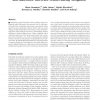Free Online Productivity Tools
i2Speak
i2Symbol
i2OCR
iTex2Img
iWeb2Print
iWeb2Shot
i2Type
iPdf2Split
iPdf2Merge
i2Bopomofo
i2Arabic
i2Style
i2Image
i2PDF
iLatex2Rtf
Sci2ools
JOCN
2010
2010
Human Brain Dynamics Accompanying Use of Egocentric and Allocentric Reference Frames during Navigation
Maintaining spatial orientation while travelling requires integrating spatial information encountered from an egocentric viewpoint with accumulated information represented within egocentric and/or allocentric reference frames. Here, we report changes in high-density EEG activity during a virtual tunnel passage task in which subjects respond to a postnavigation homing challenge in distinctly different ways--either compatible with a continued experience of the virtual environment from a solely egocentric perspective or as if also maintaining their original entrance orientation, indicating use of a parallel allocentric reference frame. By spatially filtering the EEG data using independent component analysis, we found that these two equal subject subgroups exhibited differences in EEG power spectral modulation during tunnel passages in only a few cortical areas. During tunnel turns, stronger alpha blocking occurred only in or near right primary visual cortex of subjects whose homing respo...
| Added | 19 May 2011 |
| Updated | 19 May 2011 |
| Type | Journal |
| Year | 2010 |
| Where | JOCN |
| Authors | Klaus Gramann, Julie Onton, Davide Riccobon, Hermann J. Müller, Stanislav Bardins, Scott Makeig |
Comments (0)

